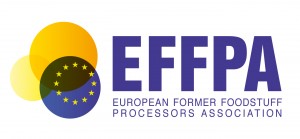Feed safety is the top priority for EFFPA members. Suppliers and customers of former foodstuff processors need to be able to have confidence in the sector to act responsibly and ensure safety and traceability of all products. Former foodstuff processors produce a feed ingredient that is commonly incorporated by compound feed manufacturers in the total feed mix. Former foodstuffs therefore are “feed business operators” under EU law and have to comply with several essential EU Regulations and Directives;
- Regulation (EC) No 183/2005 laying down Requirements for Feed Hygiene
This entire regulation is applicable to former foodstuff processors, given it applies to all feed business operators. This means inter alia that EFFPA members need to implement the principles of HACCP to achieve the highest level of feed safety possible. - Regulation (EC) No 178/2002 laying down the General Principles and Requirements of Food Law
Producers of feed for food-producing animals are intrinsically part of the food chain and the principles of the General Food Law apply. Of vital importance is that feed must be safe and may not have any adverse effect on animal or human health (Article 15), feed needs to be traceable and identifiable throughout the supply chain (Article 18) and actions are taken to withdraw unlawful products from the market (Article 20). - Regulation (EC) No 767/2009 on placing on the Market and Use of Feed
Former foodstuff processors are expected to adhere to this regulation in its entirety, being placers on the market of feed. Among other things, this regulation stipulates the labelling requirements for feed. - Regulation (EC) No 1069/2009 laying down Health Rules as regards Animal By-Products and Derived Products not intended for Human Consumption
Former foodstuffs that contain or are derived from animal by-products (milk, eggs, honey and gelatine) are identified as “category 3” animal by-products and more specifically described in Article 10(f) of this regulation. Depending on the Member State, registration according to Article 23 may be required. With Regulation (EC) No 294/2013, section 10 was amended to make clear that “ABP former foodstuffs” do not require further treatment when used in feed given they’ve already undergone treatment during the food processing. It is important to note that “ABP former foodstuffs” do not carry any elevated risks in comparison to former foodstuffs of vegetable origin, but because of the way EU legislation is formulated they need to be identifiable along the whole chain. - Regulation (EC) No 882/2004 on Official Controls performed to ensure the Verification of Compliance with Feed and Food Law
This regulation lays down the rules for official feed controls, which former foodstuff processors as feed business operators are subject to. - Regulation (EU) No 2017/1017 on the Catalogue of Feed Materials
The Catalogue of Feed Materials is a voluntary, co-regulated guide to feed materials used in EU livestock farming. The use of common definitions for the many different feed materials allows for structured dialogues between feed supply chain partners and avoids confusion. In the Annex, Part A(3), the definition of former foodstuffs is provided. With the 3rd update of the Feed Catalogue in 2017, mechanical packaging removal is included in the glossary of processes. - Directive 2002/32/EC on Undesirable Substances in Animal Feed
In the light of delivering safe feed to the market, former foodstuff processors need to comply with this entire legislation that dictates maximum limits for undesirable substances in animal feed. - Directive 2008/98/EC on Waste
The legal status of former foodstuffs destined to animal feed has not been concretely defined in EU legislation to this day. To underline former foodstuffs are not a ‘waste’ in legal terms, former foodstuff processors use Article 5 of the Waste Framework Directive, where the criteria of by-products are listed. A revised vision of the Waste Framework Directive is expected to be politically concluded in 2018.
Depending on the national context, EFFPA members take part in feed quality assurance schemes which ensure proper implementation of HACCP requirements as regards feed safety. EFFPA is developing a feed hygiene management guide for the former foodstuff processing sector in order to set the sector’s minimum requirements.
